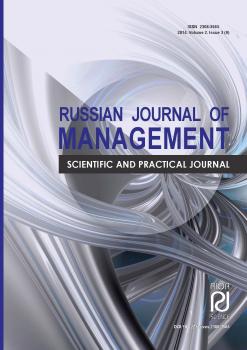The work analyzes the practice of implementation and functioning of ecological management systems in Russian electric energy companies as required by the ISO 14001 standard. Using case study and statistical analysis we research the impact of ISO 14001 certification on the dynamics of negative ecological effects of OJSC “Mosenergo”, OJSC “OGK-2”, and OJSC “TGK-2”, each of which is a pioneer in implementing ecological management systems and has several independent production units (i.e., power plants) working on different energy generation technologies. The annual company reports for 2004-2014 served as the empirical base for this research. The results of our analysis indicate that the primary reason for decreasing negative ecological effects of a company’s activity is a wish to decrease expenditure on emissions above permitted norms, which contradicts the popular opinion of the scientific society on the inefficiency of Russian management system for negative ecological consequences of company activities. We analyze possible factors that cause low efficiency of the ecological management systems in Russian energy companies, suggest ways of improvement for institutions of certification and standardization in this area.
ecological management, standardization, electric energy,ecological effects.
текст
1. Ratner S.V., Almastyan N.A. Rynochnye i administrativnye metody regulirovaniya negativnym vozdeystviem ob'ektov elektroenergetiki na okruzhayuschuyu sredu// Ekonomicheskiy analiz: teoriya i praktika, 2015, №16, S. 2-15.
2. Churkin N.P., Zhukov V.V. Gosudarstvennaya strategiya RF v oblasti ohrany okruzhayuschey sredy i prirodopol'zovaniya dolzhna otvechat' sovremennym ekologicheskim i ekonomicheskim realiyam // Ekologicheskiy Vestnik Rossii. 2013. №10. S. 1
3. Coffman M.G., Griffin J.P., Bernstein P. An assessment of greenhouse gas emissions-weighted clean energy standards // Energy Policy, 2012. No.45. P.122-132.
4. Rausch S., Mowers M. Distributional and efficiency impact of clean and renewable energy standards for electricity // Resource and Energy Economics, 2014. No. 36. P.556-585.
5. Brennan T.J., Palmer K.L. Energy efficiency resource standards: economic and policy // Utilities Policy, 2013. No.25. P.58-68.
6. Ratner S.V., Yakovina M.F. Ekonomicheskie aspekty regional'nyh programm energosberezheniya // Nacional'nye interesy: prioritety i bezopasnost', 2014, №14, S. 2-11.
7. Testa F., Rizzi F., Daddi T., Gusmerotti N. M., Frey M., Iraldo F. EMAS and ISO 14001: the differences in effectively improving environmental performance// Journal of Cleaner Production, 2014, No. 68. P.165-173
8. Schroeder J.N., Harto C.B., Clark C.E.. Federal policy documentation and geothermal water consumption: Policgaps and needs// Energy Policy, 84 (2015) 58-68
9. Ratner S.V., Almastyan N.A. Ekologicheskiy menedzhment v Rossiyskoy Federacii: problemy i perspektivy razvitiya // Nacional'nye interesy: prioritety i bezopasnost', 2014, №17, S. 37-45.
10. Fadeeva A.V. Protivorechiya v ekologo-ekonomicheskoy sisteme sovremennogo rossiyskogo obschestva kak faktor aktivizacii investiciy v chelovecheskiy kapital // Ekonomicheskie nauki, 2007. №2 (27), S. 203-204.
11. Ratner S.V. Faktory snizheniya energoemkosti ekonomiki Rossii // Nacional'nye interesy: prioritety i bezopasnost', 2014, №25, S. 2-9.
12. Ratner S.V. «Zelenye» proekty energeticheskih kompaniy: ekonomicheskie aspekty // Ekonomicheskiy analiz: teoriya i praktika, 2014, №8, S. 27-34.
13. Ratner S.V. Vliyanie regional'nyh innovacionnyh sistem na uspeshnost' realizacii programm po energosberezheniyu i povysheniyu energoeffektivnosti //Innovacii, 2015, №7, S. 60-69.
14. Lam P.T.I., Chan E.H.W., Chau C.K., Poon C.S., Chuna K.P. Environmental management system vs green specifications: how do they complement each other in the construction industry? // Journal of Environmental Management, 2011, No. 92, P.788-795.
15. Melnyk S.A., Sroufe R.P., Calantone R.L., Montabon F.L. Assessing the effectiveness of US voluntary environmental programmes: an empirical study. // International Journal of Production Research, 2002, No. 40, P.1853-1878.
16. Parry I., Evans D., Oates W. Are energy efficiency standards justified? // Journal of Environmental Economics and Management, 2014. No.67. P.104-125.
17. Khalid A., Babakri K.A., Bennett R.A., Rao S., Franchetti M. Recycling performance of firms before and after adoption of the ISO 14001 standard. // Journal of Clean Production, 2004, No. 12. P. 633-637.
18. King A.A., Lenox M.J., Terlaak A. The strategic use of decentralized institutions: exploring certification with the ISO 14001 management standard. // Academical Managemet Journal, 2005, No. 48, P. 1091-1106.
19. Doklad ob itogah deyatel'nosti Federal'noy sluzhby po akkreditacii za 2014 god i zadachah na 2015 god i srednesrochnuyu perspektivu. M.: Rosakkreditaciya, 2015. [Elektronnyy resurs] Rezhim dostupa http://fsa.gov.ru/index/staticview/id/203/














